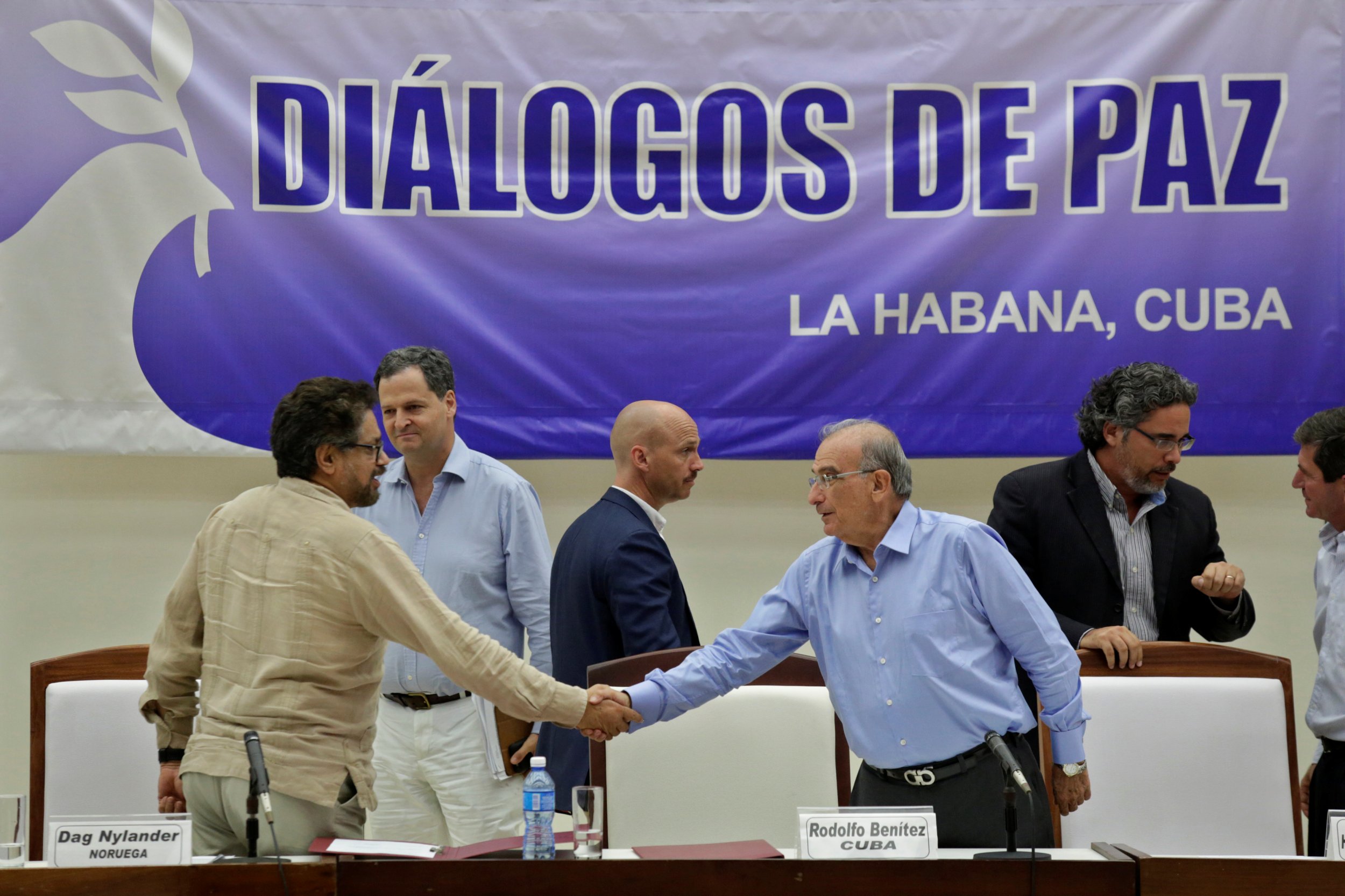Humberto De La Calle: Former Vice President Of Colombia And Architect Of The Peace Accords

Confronting Colombia’s Coca Boom Requires Patience and a Commitment to - Source www.wola.org
One of the most important figures in the Colombian peace process, Humberto de la Calle Lombana, served as Vice President of Colombia from 2012 to 2018 and was the government's chief negotiator in the peace talks with the FARC guerrilla group. His tireless efforts and unwavering commitment played a pivotal role in bringing an end to the decades-long conflict that had ravaged Colombia.
| Attribute | Details |
|---|---|
| Born | July 14, 1946 |
| Birth Place | Manizales, Colombia |
| Nationality | Colombian |
| Alma mater | University of Caldas, Externado University of Colombia, University of Paris |
| Occupation | Lawyer, politician, diplomat, academic |
| Known for | Architect of the Colombian Peace Accords |
| Political party | Liberal Party |
FAQs
Former Vice President of Colombia and Architect of the Peace Accords, Humberto De La Calle, provides insights into the complexities of peacemaking, the challenges of post-conflict societies, and the importance of international cooperation in fostering lasting peace.

Colombia's First Black Vice-President | AfricanAmerica.org - Source www.africanamerica.org
Question 1: What were the key principles that guided the peace negotiations?
The negotiations were based on the principles of human rights, equity, and transitional justice. These principles guided the design of the peace accords, ensuring that they addressed the root causes of the conflict and aimed to create a more just and inclusive society.
Question 2: How did the involvement of the international community contribute to the success of the negotiations?
The international community played a vital role by providing political support, technical assistance, and financial resources. The involvement of international observers and guarantors helped build trust and confidence between the parties, contributing to the credibility of the process.
Question 3: What are the challenges faced in implementing the peace accords and consolidating peace in Colombia?
Despite the significant progress made, challenges remain in areas such as security, land reform, and political participation. Addressing these challenges requires continued commitment from all stakeholders, including the government, former combatants, civil society, and the international community.
Question 4: How can the lessons learned from the Colombian peace process be applied to other conflicts around the world?
The Colombian peace process offers valuable lessons on the importance of inclusivity, perseverance, and the need for a comprehensive approach that addresses the political, social, and economic roots of conflict.
Question 5: What is the role of civil society in peacebuilding?
Civil society organizations play a crucial role in monitoring the implementation of peace accords, advocating for the rights of victims, and promoting reconciliation and social cohesion.
Question 6: What is the outlook for lasting peace in Colombia?
Despite the challenges, the commitment to peace remains strong in Colombia. Continued efforts are needed to overcome obstacles, consolidate peace, and ensure that the benefits of peace are shared by all.
The Colombian peace process serves as a testament to the power of dialogue and negotiation in resolving even the most intractable conflicts. It provides valuable lessons for peacebuilders around the world, demonstrating the importance of addressing the root causes of conflict, engaging all stakeholders, and fostering international cooperation.
Transition: To learn more about the complexities of peacemaking and the role of international cooperation, read the full interview with Humberto De La Calle.
Tips by Humberto De La Calle: Former Vice President Of Colombia And Architect Of The Peace Accords
Humberto De La Calle, former Vice President of Colombia and architect of the peace accords, offers valuable insights for navigating challenges and fostering peace. His experience in brokering the historic agreement between the Colombian government and the FARC rebel group provides a wealth of lessons learned. By embracing De La Calle's tips, individuals and organizations can enhance their efforts towards conflict resolution, peacebuilding, and societal transformation.
Tip 1: Prioritize Dialogue and Inclusivity
Engage all relevant stakeholders in open and respectful dialogue. Foster an environment where diverse perspectives are heard and considered. By creating an inclusive space, it is possible to build trust, bridge divides, and find common ground.
Tip 2: Embrace a Long-Term Perspective
Peacebuilding is a gradual and multifaceted process. Avoid short-sighted approaches and instead focus on sustainable solutions that address the root causes of conflict. By investing in long-term initiatives, such as education, economic development, and community engagement, the foundation for lasting peace can be laid.
Tip 3: Seek External Support and Collaboration
Recognize that external actors, such as international organizations and non-governmental organizations, can provide valuable expertise and support. Engage with these partners to leverage their resources, learning, and networks. By fostering collaboration, it is possible to amplify efforts and enhance the impact of peacebuilding initiatives.
Tip 4: Promote Truth and Reconciliation
Address the past and promote healing by creating opportunities for truth-telling, reconciliation, and forgiveness. Establish mechanisms to uncover the truth about past injustices and provide a platform for dialogue between victims and perpetrators. By confronting and acknowledging the past, it is possible to build a foundation for a more just and peaceful future.
Summary of key takeaways or benefits
By implementing these tips, individuals and organizations can contribute to a more peaceful and just world. Conflict resolution and peacebuilding are complex endeavors, but by embracing these principles and seeking inspiration from experienced leaders like Humberto De La Calle, it is possible to make a meaningful impact.
Transition to the article's conclusion
The challenges of peacebuilding require a multifaceted approach that encompasses dialogue, inclusivity, long-term thinking, collaboration, truth-seeking, and reconciliation. By embracing these principles and seeking inspiration from leaders like Humberto De La Calle, we can work towards a world where peace prevails.
Humberto De La Calle: Former Vice President Of Colombia And Architect Of The Peace Accords
Humberto De La Calle's role in Colombia's peace process and his contributions to the Peace Accords are multifaceted and significant. As a politician, diplomat, and peace negotiator, he played a pivotal role in shaping the negotiations and brokering the historic agreement that ended Colombia's long-running conflict.
- Chief Negotiator: Led the government's negotiating team in the peace talks with the FARC rebel group.
- Skilled Diplomat: Demonstrated exceptional diplomatic skills in navigating complex negotiations and building trust between conflicting parties.
- Unwavering Commitment: Remained steadfast in his pursuit of peace, even in the face of setbacks and challenges.
- Legal Expertise: Leveraged his legal background to ensure the Peace Accords were robust and comprehensive.
- Political Acumen: Navigated the political landscape, managing diverse interests and garnering support for the peace process.
- Historical Significance: De La Calle's role in the peace process has earned him recognition and respect as a key architect of Colombia's transition to peace.
Through his tireless efforts, De La Calle helped lay the groundwork for a more peaceful and just Colombia. His legacy as a peacemaker continues to inspire and guide the country's ongoing journey towards reconciliation and lasting stability.

Colombia’s First Black Vice President Francia Marquez Brings Major - Source www.bloomberg.com
Humberto De La Calle: Former Vice President Of Colombia And Architect Of The Peace Accords
Humberto De La Calle, a distinguished Colombian statesman, has dedicated his life to promoting peace and reconciliation in his homeland. De La Calle's unwavering commitment to ending the decades-long armed conflict earned him the esteemed title of "Architect of the Peace Accords," further solidifying his legacy as a visionary leader.

Colombia Peace Deal A Year Later: Violence and Drugs Surge Despite - Source www.newsweek.com
As Vice President under President Juan Manuel Santos from 2012 to 2018, De La Calle played a pivotal role in brokering and finalizing the historic peace agreement between the Colombian government and the Revolutionary Armed Forces of Colombia (FARC). The accords, signed in 2016, brought an end to more than half a century of armed conflict, which had claimed the lives of countless Colombians.
De La Calle's profound understanding of Colombia's political landscape and his deep-rooted belief in the power of dialogue proved invaluable during the arduous peace negotiations. He skillfully navigated the complex and often volatile political environment, forging consensus among diverse stakeholders and overcoming seemingly insurmountable obstacles.
The peace accords not only brought an end to the bloodshed but also laid the foundation for a more just and equitable society in Colombia. The agreement included comprehensive provisions for transitional justice, land reform, political participation, and the reintegration of former combatants into civilian life. These measures aimed to address the root causes of the conflict and create a sustainable peace for all Colombians.
De La Calle's legacy as the Architect of the Peace Accords extends beyond the signing of the agreement itself. He continues to be a tireless advocate for peace and reconciliation, working to ensure the full implementation of the accords and to promote dialogue and understanding among all sectors of Colombian society.
Conclusion
Humberto De La Calle's unwavering commitment to peace has left an enduring mark on Colombia and the international community. His visionary leadership and skillful diplomacy played a decisive role in bringing an end to the armed conflict and laying the foundation for a more just and equitable society.
The peace accords, which De La Calle helped to broker and finalize, are a testament to the transformative power of dialogue and compromise. They serve as a beacon of hope for other countries grappling with armed conflict, demonstrating that even the most protracted and seemingly intractable conflicts can be resolved through peaceful means.
عزالدين الحداد: عالم دين وأصولي سوري, Ahmed Al-Shara's Wife: Uncovering The Life And Legacy Of A Saudi Philanthropist, Pitso Mosimane: Reigning Master Tactician And African Football Legend, Ole Neumann: Visionary Danish Furniture Designer And Master Craftsman, Ivan Hlinka: Ice Hockey Legend And Symbol Of Czech Resilience, Jan Mlakar: Croatian Striker Making Waves In European Football, Charles Bietry: Visionary Photographer And Chronicler Of French History, Caracol En Vivo 2025: Shaping The Future Of Entertainment | Official Website, Vendsyssel: A Historical And Cultural Hub In Northern Jutland, Raúl Zurita: Visionary Chilean Poet And Advocate For Human Rights,